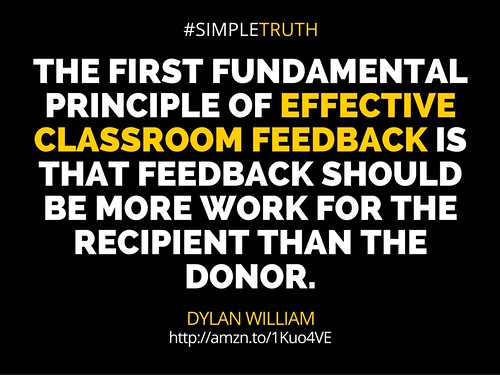School Leadership 2.0
A Network Connecting School Leaders From Around The Globe
Feedback Should be More Work for the Recipient by Bill Ferriter
Feedback Should be More Work for the Recipient
Posted by Bill Ferriter on Thursday, 09/03/2015
I've been doing a ton of reading about the impact that feedback has on student learning over the past few weeks (see here). It's something that I'm passionate about AND something about my own practice that I'm trying to polish.
One quote rolling through my mind right now is this one:
William's argument -- which he articulates nicely in Embedded Formative Assessment -- is a simple one: The primary purpose of feedback is to cause learners to think.
William's argument -- which he articulates nicely in Embedded Formative Assessment -- is a simple one: The primary purpose of feedback is to cause learners to think.
An example of William's notion of effective feedback comes from the math classroom. He argues that instead of collecting homework, marking problems right and wrong and then handing papers back with a grade, a teacher could tell each student nothing more than the number of wrong answers that can be found on their papers. Then, students should be held accountable for finding and correcting each mistakes on their own.
William shares another example from the language arts classroom. He argues that instead of correcting grammar and punctuation mistakes FOR students, teachers should make simple marks in the margin indicating sentences where students have made errors. Then, students should be held accountable for reviewing sentences with marks indicating errors, finding their own mistakes, and making corrections.
Both of these practices require LESS of the classroom teacher, don't they? It's WAY easier to simply indicate mistakes than it is to cover a student's paper in detailed corrections. And both of these practices require MORE of our students, who have to carefully return to their work -- something that rarely happens once papers are passed back in traditional classrooms. The REAL value in these examples rests in the reflection that students do after feedback is given.
Stew in all of this for a minute: If William is right that effective feedback should be more work for the recipient than the donor, how much effective feedback are you giving in your classroom?
What's keeping you from giving more?
JOIN SL 2.0
SUBSCRIBE TO
SCHOOL LEADERSHIP 2.0
Feedspot named School Leadership 2.0 one of the "Top 25 Educational Leadership Blogs"
"School Leadership 2.0 is the premier virtual learning community for school leaders from around the globe."
---------------------------
Our community is a subscription-based paid service ($19.95/year or only $1.99 per month for a trial membership) that will provide school leaders with outstanding resources. Learn more about membership to this service by clicking one of our links below.
Click HERE to subscribe as an individual.
Click HERE to learn about group membership (i.e., association, leadership teams)
__________________
CREATE AN EMPLOYER PROFILE AND GET JOB ALERTS AT
SCHOOLLEADERSHIPJOBS.COM
New Partnership
Mentors.net - a Professional Development Resource
Mentors.net was founded in 1995 as a professional development resource for school administrators leading new teacher induction programs. It soon evolved into a destination where both new and student teachers could reflect on their teaching experiences. Now, nearly thirty years later, Mentors.net has taken on a new direction—serving as a platform for beginning teachers, preservice educators, and
other professionals to share their insights and experiences from the early years of teaching, with a focus on integrating artificial intelligence. We invite you to contribute by sharing your experiences in the form of a journal article, story, reflection, or timely tips, especially on how you incorporate AI into your teaching
practice. Submissions may range from a 500-word personal reflection to a 2,000-word article with formal citations.

You need to be a member of School Leadership 2.0 to add comments!
Join School Leadership 2.0